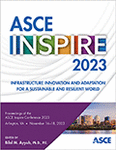The Resilience Performance Assessment (RPA), an Innovative Solution to Measure the Benefits of Adaptation Investments for Infrastructure, Buildings, and Territories
Publication: ASCE Inspire 2023
ABSTRACT
Prioritizing the adaptation of infrastructure and territories is an emergency, especially given that the cost of inaction now significantly exceeds the cost of prevention. However, if indicators can be found in the literature to evaluate physical and socio-economic vulnerability of critical infrastructure, there is no existing tool intended for decision-makers to measure the “performance” of measures, policies, or investments aiming to improve the resilience of infrastructure in their territorial context. For this purpose, Resallience has developed the Resilience Performance Assessment (RPA). It is an innovation composed of (1) a GIS-based platform allowing a comprehensive visualization of climate change impacts; and (2) an analytical dashboard to support stakeholders in prioritizing adaptation strategies and investments. This paper explains how the RPA has been applied for two entire Caribbean islands to provide a comprehensive visualization of current and future climate change impacts and a ranking of the most performant investment projects to reach national and international resilience targets.
Get full access to this article
View all available purchase options and get full access to this chapter.
REFERENCES
Agrawala, S. (2011). “Adapting to Climate Change: Costs, Benefits, and Modelling Approaches”. International Review of Environmental and Resource Economics, 5(3), 245–284.
Byun, H.-R., and Lee, D.-K. (2002). “Defining Three Rainy Seasons and the Hydrological Summer Monsoon in Korea using Available Water Resources Index”. Journal of the Meteorological Society of Japan. Ser. II, 80(1), 33–44.
Cai, H., Lam, N., Qiang, Y., Zou, L., Correll, R., and Mihunov, V. (2018). “A Synthetis of Disaster Resilience Measurement Methods and Indices.” International Journal of Disaster Risk Reduction, 31.
Casello, J., and Towns, W. (2017). “Urbain”. In Risques climatiques et pratiques en matière d’adaptation pour le secteur canadien des transports 2016, Palko K. and Lemmen D.S., eds. Gouvernement du Canada, Ottawa, 289–340.
Dobrowski, S. Z., and Parks, S. A. (2016). “Climate change velocity underestimates climate change exposure in mountainous regions”. Nature Communications, 7(1), 12349, 1-8.
IPCC. (2021). Climate Change, 2021: The Physical Science Basis. Contribution of Working Group I to the Sixth Assessment Report of the Intergovernmental Panel on Climate Change. Cambridge University Press.
Koks, E. E., Jongman, B., Husby, T. G., and Botzen, W. J. W. (2015). “Combining hazard, exposure and social vulnerability to provide lessons for flood risk management.” Environmental Science & Policy, 47, 42–52.
Lhomme, S., Serre, D., Diab, Y., and Laganier, R. (2010). « Les réseaux techniques face aux inondations ou comment définir des indicateurs de performance de ces réseaux pour évaluer la résilience urbaine.», Bulletin de l’Association de géographes français, 487–502.
Metzger, P., and D’Ercole, R. (2009). « Enjeux territoriaux et vulnérabilité – Une approche opérationnelle ». In Risques et environnement : recherches interdisciplinaires sur la vulnérabilité des sociétés, Becerra and Peltier, eds. Paris, L’Harmattan, 391–402.
Moser, S. C., and Ekstrom, J. A. (2010). “A framework to diagnose barriers to climate change adaptation”. Proceedings of the National Academy of Sciences, 107(51), 22026–22031.
Neda Naghshbandi, S., et al. (2016). “A review of methods to study resilience of complex engineering and engineered systems”. IEEE Access, 4, 1–27.
Saaty, T. L. (1980). The Analytic Hierarchy Process. New-York, McGraw-Hill.
Schwarze, R., Oberpriller, Q., Peter, M., and Füssler, J. (2022). “Modelling the Cost and Benefits of Adaptation. A Targeted Review on Integrated Assessment Models with a Special Focus on Adaptation Modelling”. Chapter 1 in Climate Adaptation Modelling, Kondrup C., Mercogliano P., Bosello F., Mysiak J., Scoccimarro E., Rizzo A., Ebrey R., de Ruiter M., Jeuken A., Watkiss P., eds. Springer Climate (Open Access), 5–11.
Soto, D., and Renard, F. (2015). “New prospects for the spatialisation of technological risks by combining hazard and the vulnerability of assets”. Natural Hazards, 79, 1531–1548.
UNDP. (2017). Social vulnerability assessment tools for climate change and DRR programming, 48 p.
Information & Authors
Information
Published In
History
Published online: Nov 14, 2023
ASCE Technical Topics:
- Benefit cost ratios
- Buildings
- Business management
- Climate change
- Climates
- Computer vision and image processing
- Engineering fundamentals
- Environmental engineering
- Financial management
- Infrastructure
- Infrastructure resilience
- Innovation
- Investments
- Management methods
- Methodology (by type)
- Practice and Profession
- Quality control
- Structural engineering
- Structures (by type)
Authors
Metrics & Citations
Metrics
Citations
Download citation
If you have the appropriate software installed, you can download article citation data to the citation manager of your choice. Simply select your manager software from the list below and click Download.
